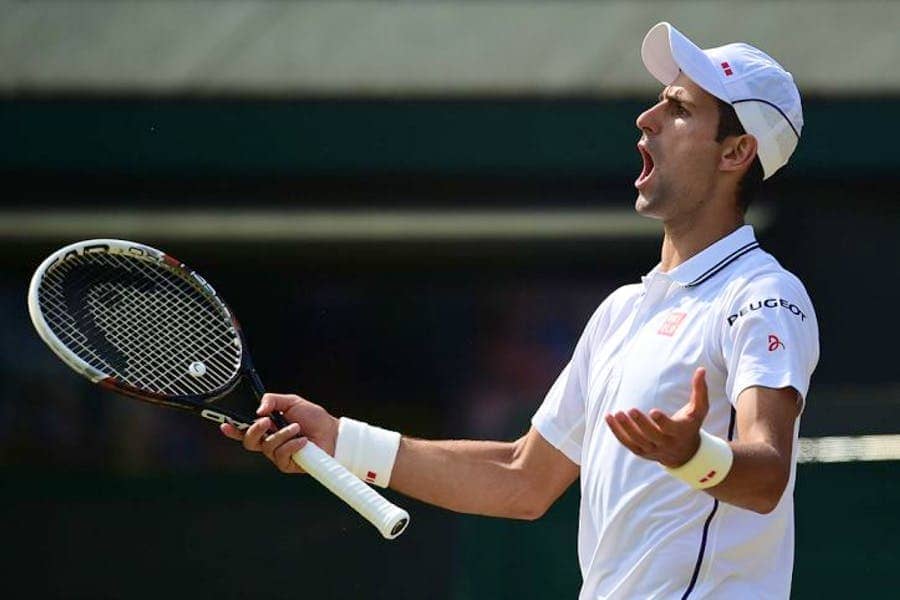Novak Djokovic’s readiness to walk away from tennis on a point of principle is an act of sporting heroism on a par with Muhammad Ali’s refusal to fight in the Vietnam war.
Like Ali was when he said he had ‘no quarrel with them Viet Cong’, Djokovic is widely accepted to be the greatest master of his sport of all time. Ali, then at the height of his powers, was banned from boxing for three years for his stance.
For refusing to take a Covid vaccination — a matter of conscience — we don’t yet know for how long Djokovic will be prevented from playing tennis at the highest level. If the bureaucrats who get to decide are of the same mentality — and quality — as the ones who so ludicrously kicked him out of Australia in January, then you’d have to say there is a chance he might never play again.
Asked by the BBC’s Amol Rajan whether he was really prepared to sacrifice his ability to compete, for example at Wimbledon or Roland Garros, for autonomy over what is put into his body, Djokovic said simply: ‘That is the price I am willing to pay’.
“The principles of decision-making on my body are more important than any title or anything else. I’m trying to be in tune with my body as much as I possibly can.”
This was a formulation of words more heroic than any of the Serb’s incredible feats on the court
For those of us who believe in individual liberty, this was a formulation of words more heroic than any of the Serb’s incredible feats on the court, not least because he has so much to lose — starting with the chance to realise the rarest of destinies by ending his career with a record number of Grand Slam titles.
The irony is that none of the controversy that has surrounded Djokovic since he touched down in Melbourne to compete in the Australia Open has really been about him.
Rather, it has been about the relationship between the state and the individual, and the extent to which that relationship has been monkeyed with in countries we previously thought of as free over the last two, pox-ridden years.
In this respect, Djokovic is merely a lightning conductor for a culture war between people who believe the government has every right to decide (and impose) what is best for us, and those who think the manner in which Australia, New Zealand and Canada have used the crisis to consolidate power over citizens is terrifying.
Djokovic did not ask for any of this. In fact, until his disgraceful treatment in Australia — to which he was invited after having submitted his antibodies, as requested, and then thrown out for political expediency — he had remained steadfastly apolitical on the subject of vaccinations. He’d made no effort to publicise his views.
Now he is both a poster boy for the global antivax movement and a focus for the ire of those who believe the unvaccinated are selfish morons who could overwhelm the medical system. That Djokovic hasn’t just given in to make it all go away — and to continue playing tennis — is to his eternal credit.
‘The principle of decision making on my body is more important than any title, or anything else’, he told the BBC.
Unbelievably, there are now those who would even mock Djokovic for his stance — not least the famously awful low-cost carrier Ryanair, an airline whose CEO Michael O’Leary once registered his Mercedes as a taxi so he could he use Dublin’s bus lanes.
If power reveals, as it is said to, then two years into the pandemic, do we like what we’re seeing? Increasingly, it appears we do not. How else to explain the large-scale protests taking place in Wellington, Canberra, and now, most famously, in Ottawa?
A tide feels as if it is turning, one that won’t be held back even through invocation of emergency powers — the sinister method now being attempted by the more and more ridiculous-seeming Canadian Prime Minister Justin Trudeau in his efforts to make the vaccine mandate-opposing trucker protests evanesce.
If it is turning — and in the absence of a terrible new variant — then could Djokovic not yet emerge as a popular hero of the pandemic, exactly in the manner Ali eventually emerged a hero by refusing to be inducted into a disastrous war?
Obviously, it’s too early to know, but at a time when the things we have long been impelled to venerate increasingly are shown to be mutable — from the empirical scientific truths upon which our societies are founded to the social contracts by which we agree to be governed — Djokovic’s resolve is all the more admirable. The hope, of course, is that sanity prevails and by the summer we will see Djokovic in action — and winning — once again, at Wimbledon, if nowhere else.
When Ali returned from his ban, he was defeated by Joe Frazier at Madison Square Garden, a result that mercifully turned out to be a blip on his path to regaining his position at the zenith of his sport.
For those of us who believe Novak Djokovic has demonstrated courage in his convictions — and character — every bit as impressive as Ali’s, that is the position to which we hope he will also return.
Character, after all, is destiny.






Comments